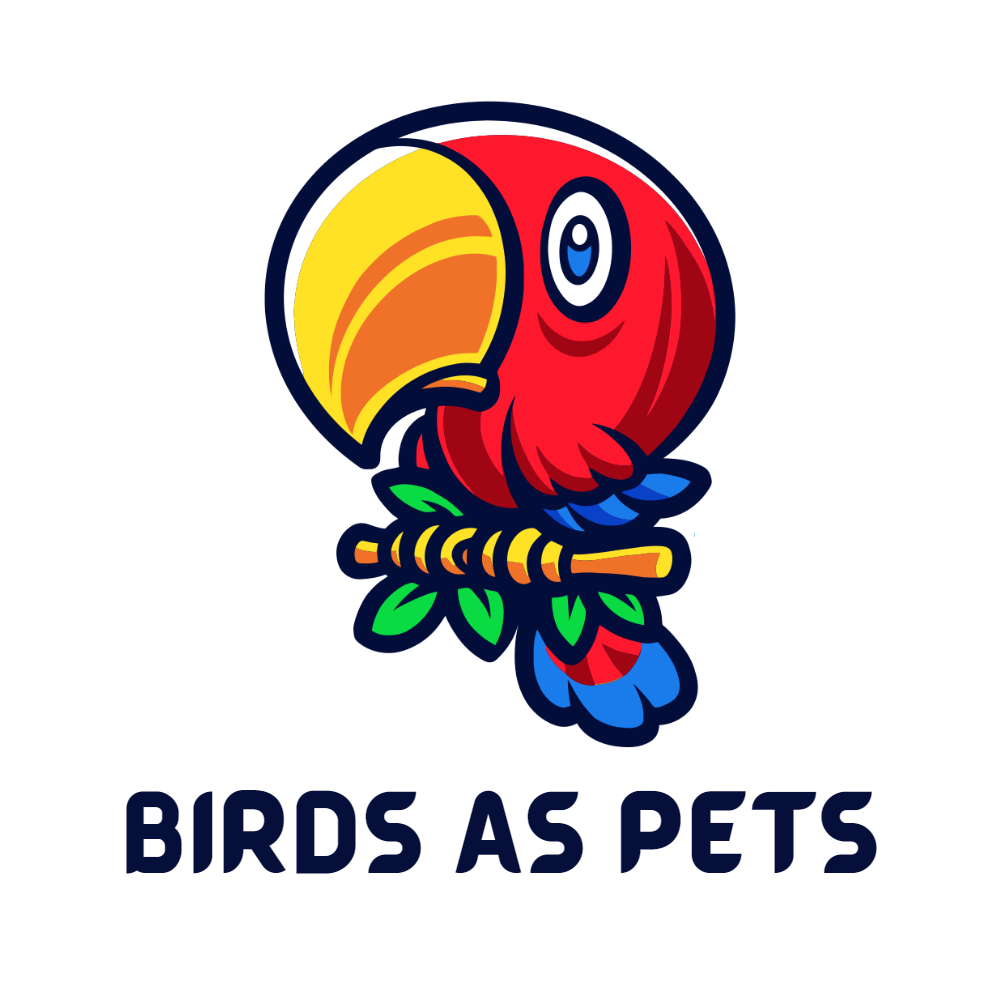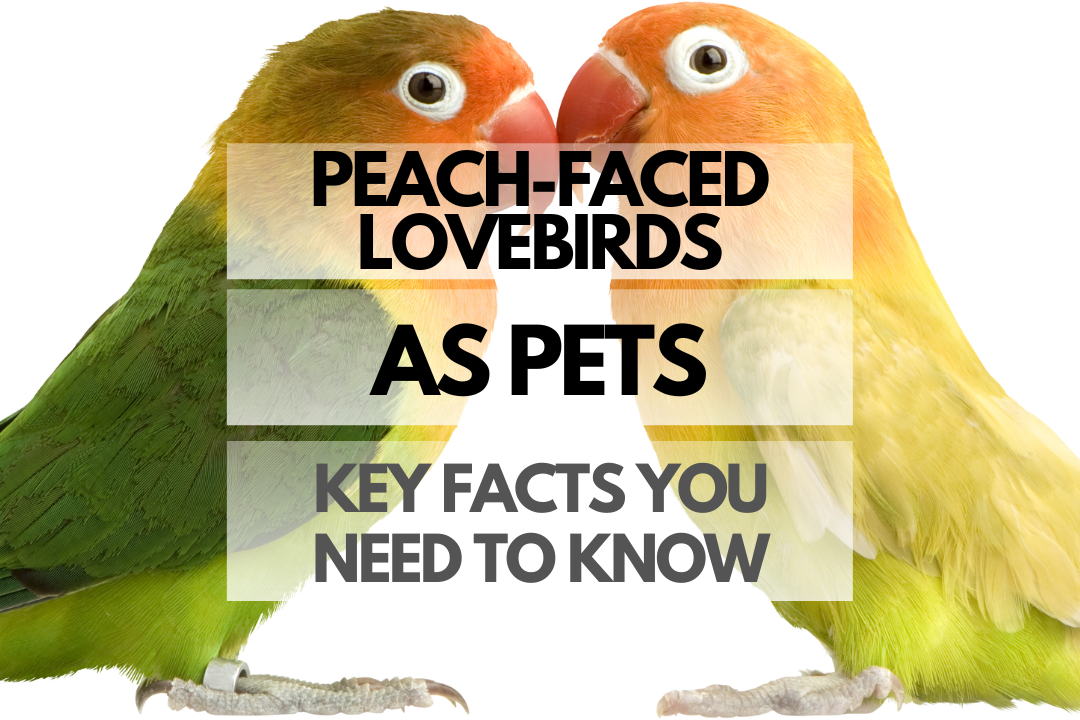If you’re considering adding a Peach-faced Lovebird to your family, you’re in for a treat! These small, colorful parrots are known for their affectionate personalities and playful antics. In this comprehensive guide, we’ll cover everything you need to know about these charming birds, from their natural habitat to their care requirements, to help you decide if a Peach-faced Lovebird is the right fit for you.
Quick Reference Table: Peach-faced Lovebird Facts
| Fact | Details |
|---|---|
| Scientific Name | Agapornis roseicollis |
| Size | 5-6 inches (13-15 cm) |
| Weight | 1.5-2 ounces (40-60 grams) |
| Life Expectancy | 10-15 years in captivity |
| Color | Primarily green with a peach-colored face and blue tail feathers |
| Noise Level | Moderate, can be chatty |
| Temperament | Affectionate, social, and playful |
Where Do Wild Peach-faced Lovebirds Live?
Peach-faced Lovebirds originate from the arid regions of southwestern Africa, specifically in parts of Namibia, Botswana, and South Africa. They inhabit savannas, scrublands, and dry woodlands, where they can often be found in large, noisy flocks around water sources.
Peach-faced Lovebirds Lifespan: How Long Do They Live as Pets?
With proper care, Peach-faced Lovebirds can live between 10 and 15 years in captivity. To ensure a long, healthy life for your pet, it’s essential to provide a balanced diet, a clean environment, and regular veterinary check-ups. Additionally, owning a Peach-faced Lovebird requires a significant time commitment as they thrive on social interaction and mental stimulation.
Are Peach-faced Lovebirds Good Pets?
Peach-faced Lovebirds can make excellent pets for the right person or family. They are known for their affectionate nature, social behavior, and playful personalities. These birds form strong bonds with their owners and enjoy spending time with their human companions. However, it’s essential to provide them with proper care, including a balanced diet, a clean environment, and regular socialization to ensure their happiness and well-being.
Are Peach-faced Lovebirds as Pets Good for Beginners?
Peach-faced Lovebirds can be suitable for first-time bird owners due to their small size and relatively simple care requirements. However, it’s essential for beginners to educate themselves on proper bird care and be prepared to invest time and effort into socializing, training, and caring for their new pet.
Are Peach-faced Lovebirds Easy to Care For?
While Peach-faced Lovebirds are generally low-maintenance pets, they do require some specific care to ensure their health and happiness. This includes providing a spacious cage, a balanced diet, regular cleaning, and plenty of social interaction and mental stimulation. With proper care and attention, these birds can thrive in a home environment.
Peach-faced Lovebirds Pros and Cons
| Pros | Cons |
|---|---|
| Affectionate and social | Can be noisy |
| Small size | Need a spacious cage |
| Playful and entertaining | Require regular social interaction |
| Relatively easy to care for | Can be territorial or nippy |
Peach-faced Lovebirds Price and Costs
The price of a Peach-faced Lovebird can range from $50 to $200, depending on factors such as age, color mutations, and whether they are hand-raised or parent-raised. Initial setup costs include purchasing a spacious cage, toys, perches, food dishes, and bedding. Ongoing expenses include food, replacement toys, and regular veterinary check-ups.
Where to Buy Peach-faced Lovebirds
When looking to purchase a Peach-faced Lovebird, it’s essential to find a reputable breeder or pet store that can provide information on the bird’s history and health. You can also check with local bird clubs or online forums for recommendations. Adoption is another option, as there are often birds in need of loving homes through rescue organizations and shelters.
Caring for Peach-faced Lovebirds
Peach-faced Lovebirds Food
A balanced diet is crucial for your Peach-faced Lovebird’s health. This should include a high-quality pellet or seed mix, along with a variety of fresh fruits, vegetables, and leafy greens. Occasional treats like nuts and millet sprays can also be offered. Be sure to provide fresh water daily and remove any uneaten fresh food to prevent spoilage.
Health and Common Issues
While Peach-faced Lovebirds are generally hardy, they can be prone to certain health issues, such as respiratory infections, feather plucking, and vitamin deficiencies. Regular veterinary check-ups can help detect any potential problems early on, and maintaining a clean environment and balanced diet is vital for preventing health issues.
Signs of Healthy Peach-faced Lovebirds vs. a Sick One
| Healthy Peach-faced Lovebird | Sick Peach-faced Lovebird |
|---|---|
| Bright, clear eyes | Cloudy or watery eyes |
| Smooth, well-groomed feathers | Ruffled, plucked, or dirty feathers |
| Active and alert | Lethargic or unresponsive |
| Normal droppings | Abnormal droppings (e.g., watery, discolored) |
| Regular appetite | Loss of appetite or weight loss |
| No visible injuries or swellings | Visible injuries, swellings, or growths |
Peach-faced Lovebirds Pet Insurance
While pet insurance for birds is less common than for cats and dogs, it is available and can be beneficial for Peach-faced Lovebird owners. Insurance can help cover the cost of veterinary care in case of illness or injury, giving you peace of mind and financial protection. Be sure to research different providers and choose a plan that best suits your needs and budget.
Personality and Behavior
Peach-faced Lovebirds are known for their affectionate, playful, and social personalities. They form strong bonds with their owners and enjoy spending time interacting with them. These energetic birds love to explore, play with toys, and can even learn simple tricks. However, they can be territorial and nippy if they feel threatened or their personal space is invaded.
Are Peach-faced Lovebirds Social?
Yes, Peach-faced Lovebirds are very social creatures. In the wild, they live in large flocks, and in captivity, they thrive on companionship, whether it’s with their human owners or other birds. They need regular social interaction to stay emotionally healthy and can become depressed or develop behavioral issues if left alone for extended periods.
Speech and Noise of Peach-faced Lovebirds
Peach-faced Lovebirds are not known for their talking abilities like some larger parrot species. However, they can learn to mimic whistles and simple sounds. These birds can be chatty and moderately noisy, making a variety of chirps, squeaks, and tweets. While their vocalizations are generally not as loud as larger parrots, it’s essential to consider noise levels before bringing a Peach-faced Lovebird into your home.
Similar Species to Peach-faced Lovebirds
Other species in the Lovebird genus (Agapornis) share similarities with the Peach-faced Lovebird. Some of these include:
- Fischer’s Lovebirds (Agapornis fischeri)
- Masked Lovebirds (Agapornis personatus)
- Black-cheeked Lovebirds (Agapornis nigrigenis)
- Lilian’s Lovebirds (Agapornis lilianae)
These species have similar care requirements and social traits, but may have different colors and markings.
Can Peach-faced Lovebirds Live With Other Pets and Birds?
While Peach-faced Lovebirds can coexist with other birds, it’s important to monitor their interactions closely. They may be territorial and aggressive towards other birds, especially if they feel their space is being invaded. It’s generally best to house Peach-faced Lovebirds separately from other bird species to prevent conflicts. As for other pets, such as cats or dogs, always supervise interactions and never leave your bird unsupervised with other animals.
Are Peach-faced Lovebirds Legal to Have as Pets?
In most countries and regions, Peach-faced Lovebirds are legal to own as pets. However, it’s essential to check your local laws and regulations regarding bird ownership, as some areas may have restrictions or permit requirements. It’s also crucial to ensure that you are purchasing a captive-bred bird, as wild-caught birds are often illegal and contribute to the decline of wild populations.
Additional Resources
- Lovebirds: Owner’s Manual and Reference Guide by Dirk van den Abeele
- Reddit’s Lovebirds Community
- Lovebird Owners Facebook Group
- Avicultural Journal: Lovebird Breeding and Care
FAQ for Peach-faced Lovebirds as Pets
Do Peach-faced Lovebirds talk?
While Peach-faced Lovebirds can learn to mimic whistles and simple sounds, they are not known for their talking abilities like some larger parrot species.
Are Peach-faced Lovebirds suitable for families with young kids?
Yes, Peach-faced Lovebirds can be suitable for families with young kids, as long as the children are taught to handle the bird gently and respect its space. However, it’s essential to supervise interactions to ensure the safety of both the child and the bird.
Can Peach-faced Lovebirds be trained?
Yes, Peach-faced Lovebirds can be trained to perform simple tricks and learn basic commands. Positive reinforcement techniques, such as clicker training and offering treats, can be very effective in teaching these intelligent birds new skills.
How do I know what gender Peach-faced Lovebirds are?
Determining the gender of Peach-faced Lovebirds can be challenging, as males and females look very similar. The most reliable way to determine gender is through DNA testing, which can be done by a veterinarian or specialized laboratory.
What is the average lifespan of a Peach-faced Lovebird?
With proper care, Peach-faced Lovebirds can live for 10-15 years or even longer. A balanced diet, regular exercise, and routine veterinary care are vital for ensuring a long, healthy life for your bird.
What should I feed my Peach-faced Lovebird?
A balanced diet for Peach-faced Lovebirds should include a high-quality pellet or seed mix, fresh fruits and vegetables, and occasional protein sources like cooked eggs or lean meats. Avoid avocado, chocolate, caffeine, and alcohol, as these can be toxic to birds.

